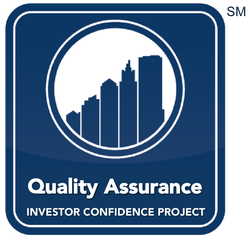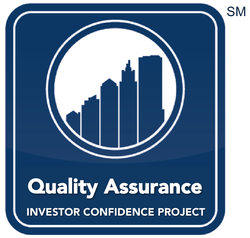
The ICP Technical team continued discussions regarding the ICP Quality Assurance (QA) Credential on February 27th, 2015. The Team is working to have a version 1.0 of the QA Provider Credential, as well as the associated QA Specification and QA Checklist prepared by the end of March. With this goal in mind, the discussions focused on what the QA process should involve. The following are highlights from the conversation with the Technical Forum:
- On traditional projects currently, reviewers are brought on at different stages of a project, often late in a project's development, and there is much effort simply placed on finding the information necessary for the QA efforts. This information is also not usually in a standardized format, regarding calculations, reports, etc.
- While the ICP does not require specific formats for information, it does standardize, through references to existing guidelines and standards, the information that needs to be collected, and that proper documentation needs to be provided.
- Reasonableness - when a reviewer looks at the assumptions used in a project, what can be defined as reasonable? There was consensus that there are not many resources currently available to assist with these efforts. These resources may be developed in the future, but are not currently available. The best resource that the market currently can offer is the experience of the QA provider. While this will vary, ICP makes an attempt to bring some criteria to bear on this resource, through its QA Provider Credential Requirements (refer to notes from the meeting on 2/9/15).
- Who pays for the QA efforts? - This can be a program, or the building owner, or the financier, or the developer. The fact is that these costs are already incurred by projects, and the review may even happen multiple times on a project by different parties involved. ICP works to standardize these efforts, so that it is a one-person / firm exercise, with direction regarding the expectations and the process to employ.
- What happens if a QA provider and a PD cannot agree on what is reasonable? - The building owner or the financier has the final decision regarding whether a project can/should move forward. The QA provider and PD need to take a collaborative approach to the review efforts - review / comment / resolve. If a resolution cannot be managed, the project can still move forward. Documentation will be provided as a result of these QA efforts that will establish issues that were identified, and whether or not they were resolved. This will allow stakeholders to reflect on projects that did or did not perform, with documentation illustrating what was identified during the QA process, and how it was addressed or not addressed.
- Fundamentally, the ICP QA process focuses on ensuring that a project complies with the ICP protocols. This is a binary process, and can be accomplished by filling out the ICP checklist. And to a certain extent, this is what financiers want to see - did the project follow the ICP process or not?
- So should the QA provider be addressing the "assumptions" piece? Essentially, should the "assumptions" piece be dropped from the QA provider's role? This is an important component of the QA provider's value, and though not well defined by the industry with regards to what is reasonable, it is an important aspect of the review process. ICP can only base reasonableness on the experience and credentials of the QA providers, until the marketplace matures and better guidelines are available to provide more direction on this front.



 RSS Feed
RSS Feed